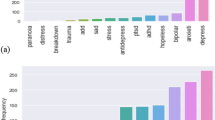Abstract
It is predicted that mental illness will be one of the leading causes of death in 2030. Many people will not share their details of the illness detail with others, including family and friends. Also, many are unaware that their mental disorder is affecting their thinking and behavior. Early detection and medical intervention are necessary, otherwise it leads to severe problems. More than half of the world population, that is around 58.4% of the people use Social Media (SM) to express their thoughts and feelings. By fetching their timely thoughts and feelings expressed in social media we can analyze their emotions and sub-emotions. In this study, we developed a novel model to generate the sub-emotions of social media users from EmoLEX lexicon using the Affinity Propagation (AP) algorithm and word2vect conversion word2vec-google-news-300. The number of clusters and vocabulary obtained for ten emotions such as Anger, Anticipation, Disgust, Fear, Joy, Sadness, Surprise, Trust, Positive and Negative is evaluated based on sub-emotions generated. By using word2vect conversions and AP algorithm it is found that the consistency of Mean words (µW) per cluster are equally distributed in each cluster with respect to all emotions on an average of 19, 20, 21 and 22. The obtained sub-emotions is used to mask the SM user post and it could be further used for detecting the mental illness of SM users.
Access this chapter
Tax calculation will be finalised at checkout
Purchases are for personal use only
Similar content being viewed by others
References
Srinath, K.S., Kiran, K., Pranavi, S., Amrutha, M., Shenoy, P.D., Venugopal, K.R.: Prediction of depression, anxiety and stress levels using dass-42. In: 2022 IEEE 7th International conference for Convergence in Technology (I2CT), pp. 1–6 (2022). https://doi.org/10.1109/I2CT54291.2022.9824087
Mental Health: New Understanding New Hope in World Health Report, Geneva, p. 9 (2001)
Depression: a global crisis (2012). https://www.who.int/mental_health/management/depression/wfmh_paper_depression_wmhd_2012.pdf
https://datareportal.com/reports/digital-2022-global-overview-report
Aragon, M.E., Lopez-Monroy, A.P., Gonzalez-Gurrola, L.C.G., Montes, M.: Detecting mental disorders in social media through emotional patterns - the case of anorexia and depression. In: IEEE Transactions on Affective Computing. https://doi.org/10.1109/TAFFC.2021.3075638
Huang, X., Zhang, L., Liu, T., Chiu, D., Zhu, T., Li, X.: Detecting suicidal ideation in Chinese microblogs with psychological lexicons. In: 2014 IEEE 11th Intl Conference on Ubiquitous Intelligence and Computing and 2014 IEEE 11th Intl Conference on Autonomic and Trusted Computing and 2014 IEEE 14th Intl Conference on Scalable Computing and Communications and Its Associated Workshops, pp. 844–849 (2014)
APA Dictionary of Psychology. https://dictionary.apa.org/emotion, American Psychological Association (2022)
Hockenbury, D., Hockenbury, S.E.: Discovering Psychology. Worth Publishers
Ekman, P.E.D., Davidson, R.J.: The Nature of Emotion: Fundamental Questions. Oxford University Press, New York, NY, US (1994)
Aragón, M.E., Monroy, A.P.L., González-Gurrola, L.C., Montes, M.: Detecting depression in social media using fine-grained emotions. In: Proceedings of the 2019 Conference of the North American Chapter of the Association for Computational Linguistics: Human Language Technologies, Volume 1 (Long and Short Papers), pp. 1481–1486 (2019). https://doi.org/10.18653/v1/N19-1151
Srinath, K.S., Kiran, K., Gagan, A.G., Jyothi, D.K., Shenoy, P.D., Venugopal, K.R.: Enhancing mental illness prediction using tree based machine learning approach. In: 2022 IEEE International Conference on Electronics, Computing and Communication Technologies (CONECCT), pp. 1–5 (2022). https://doi.org/10.1109/CONECCT55679.2022.9865689
Li, S., Liu, Y., Kumar, V.: Deep learning-based mental health model on primary and secondary school students quality cultivation. Comput. Intell. Neurosci. 1687–5265 (2022). https://doi.org/10.1155/2022/7842304
Acik, M., Altan, M., Cakiroglu, F.P.: A cross-sectionally analysis of two dietary quality indices and the mental health profile in female adults. Current Psychol. 1–10 (2020)
Renaldi, A., Maharani, W.: Depression detection of user in media social Twitter using random forest. J. Inf. Syst. Res. (JOSH) 3(4), 410–416 (2022)
Smys, S., Raj, J.S.: Analysis of deep learning techniques for early detection of depression on social media network-a comparative study. J. Trends Comput. Sci. Smart Technol. (TCSST), 03, 24–39. (2021). https://doi.org/10.36548/jtcsst.2021.1.003
Mohammad, S.M., Turney, P.D.: Crowdsourcing a Word-Emotion Association Lexicon. Comput. Intell. 29, 436–465 (2013)
Mohammad, S.M., Turney, P.D.: Emotions evoked by common words and phrases: using mechanical Turk to create an emotion lexicon. Comput. Linguist. pp. 26–34 (2010)
Thavikulwat, P.: Affinity propagation: a clustering algorithm for computer-assisted business simulation and experimental exercises. In: Developments in Business Simulation and Experiential Learning, vol. 35 (2008)
Author information
Authors and Affiliations
Corresponding author
Editor information
Editors and Affiliations
Rights and permissions
Copyright information
© 2024 The Author(s), under exclusive license to Springer Nature Switzerland AG
About this paper
Cite this paper
Srinath, K.S., Kiran, K., Shenoy, P.D., Venugopal, K.R. (2024). Generating Sub-emotions from Social Media Data Using NLP to Ascertain Mental Illness. In: Ortis, A., Hameed, A.A., Jamil, A. (eds) Advanced Engineering, Technology and Applications. ICAETA 2023. Communications in Computer and Information Science, vol 1983. Springer, Cham. https://doi.org/10.1007/978-3-031-50920-9_31
Download citation
DOI: https://doi.org/10.1007/978-3-031-50920-9_31
Published:
Publisher Name: Springer, Cham
Print ISBN: 978-3-031-50919-3
Online ISBN: 978-3-031-50920-9
eBook Packages: Computer ScienceComputer Science (R0)




